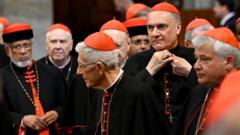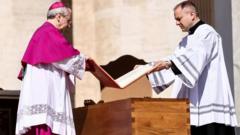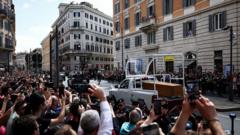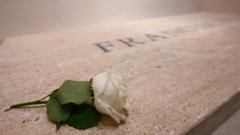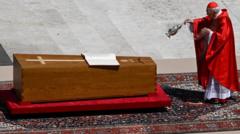With the Catholic Church witnessing unparalleled growth in Africa, experts speculate whether the next pope could hail from the continent. Despite having three African pontiffs in history, including Pope Gelasius I who perished over 1,500 years ago, the current representation of African clergy in the Vatican raises questions about future leadership. Prominent figures like Cardinal Robert Sarah of Guinea and Cardinal Fridolin Ambongo of DR Congo seem to be gaining traction, but skepticism remains.
**Could Africa Finally Offer the Next Pope?**

**Could Africa Finally Offer the Next Pope?**
As the global Catholic population surges, Africa emerges as a front-runner for the next papal election.
In a landscape marked by debates on identity and representation, many argue that the cardinal-electors must transcend geographical prejudices and focus on selecting leaders based on theological expertise. While there’s a longing for an African pope, the tensions over cultural issues, particularly regarding LGBT rights, may complicate the selection process. As Pope Francis has set a precedent for inclusivity and advocacy for the dispossessed, will the next pope reflect these values or reinforce existing power structures?
In any case, the upcoming conclave promises to be a significant moment in the history of the Church.
---
If the growth of the Catholic Church in Africa dictates the next Pope, the result may surprise many.
As the cardinal-electors prepare to choose Pope Francis' successor, the towering growth of the Catholic population in Africa stands at the forefront. This demographic shift raises the question of whether the next pope will be African, a possibility that is both welcomed and debated among theologians and church leaders. With the continent's Catholic population now constituting over 20% of the global faithful, voices advocating for an African leader recognize that representation matters, yet they also caution against solely appointing someone based on geographical origins.
Despite influential figures like Cardinal Robert Sarah and Cardinal Fridolin Ambongo gaining global attention, the conversation is mired in concerns about tokenism and a lack of senior African clergy in pivotal Vatican roles. Critics, such as Father Paulinus Ikechukwu Odozor, emphasize that the pope must transcend specific ethnic identities and embody the universal concerns of the Church.
As the Vatican navigates its stance on pressing issues — particularly cultural attitudes towards LGBT rights — the outcome of this discussion will significantly shape the Church’s future. Will African cardinals influence the conclave's choice or maintain the status quo? Despite the emphasis on diversity, entrenched power dynamics and unresolved questions about race play a crucial role in this unfolding narrative. The world watches in anticipation as the Church stands at this pivotal crossroads.
In any case, the upcoming conclave promises to be a significant moment in the history of the Church.
---
If the growth of the Catholic Church in Africa dictates the next Pope, the result may surprise many.
As the cardinal-electors prepare to choose Pope Francis' successor, the towering growth of the Catholic population in Africa stands at the forefront. This demographic shift raises the question of whether the next pope will be African, a possibility that is both welcomed and debated among theologians and church leaders. With the continent's Catholic population now constituting over 20% of the global faithful, voices advocating for an African leader recognize that representation matters, yet they also caution against solely appointing someone based on geographical origins.
Despite influential figures like Cardinal Robert Sarah and Cardinal Fridolin Ambongo gaining global attention, the conversation is mired in concerns about tokenism and a lack of senior African clergy in pivotal Vatican roles. Critics, such as Father Paulinus Ikechukwu Odozor, emphasize that the pope must transcend specific ethnic identities and embody the universal concerns of the Church.
As the Vatican navigates its stance on pressing issues — particularly cultural attitudes towards LGBT rights — the outcome of this discussion will significantly shape the Church’s future. Will African cardinals influence the conclave's choice or maintain the status quo? Despite the emphasis on diversity, entrenched power dynamics and unresolved questions about race play a crucial role in this unfolding narrative. The world watches in anticipation as the Church stands at this pivotal crossroads.

